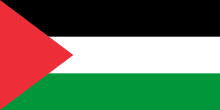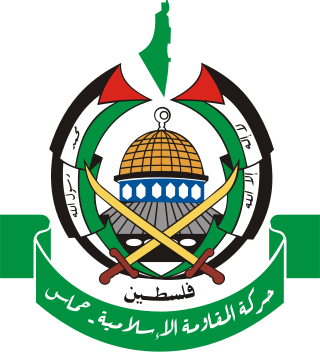
The Islamic Resistance Movement, abbreviated Hamas, is a Palestinian nationalist Sunni Islamist political organisation with a military wing called the Izz al-Din al-Qassam Brigades. It has governed the Israeli-occupied Gaza Strip since 2007.

Palestinians are an Arab ethnonational group native to the region of Palestine.
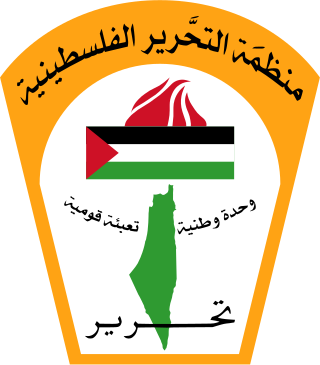
The Palestine Liberation Organization is a Palestinian nationalist coalition that is internationally recognized as the official representative of the Palestinian people in both the Palestinian territories and the diaspora. It is currently represented by the Palestinian Authority based in the West Bank city of Al-Bireh.

The United Nations Relief and Works Agency for Palestine Refugees in the Near East is a UN agency that supports the relief and human development of Palestinian refugees. UNRWA's mandate encompasses Palestinians who fled or were expelled during the Nakba, the 1948 Palestine War, and subsequent conflicts, as well as their descendants, including legally adopted children. As of 2019, more than 5.6 million Palestinians are registered with UNRWA as refugees.

Zionism is an ethnocultural nationalist movement that emerged in Europe in the late 19th century and aimed for the establishment of a national home for the Jewish people through the colonization of Palestine, an area roughly corresponding to the Land of Israel in Judaism, and of central importance in Jewish history. Zionists wanted to create a Jewish state in Palestine with as much land, as many Jews, and as few Palestinian Arabs as possible.

The Israeli–Palestinian conflict is an ongoing military and political conflict about land and self-determination within the territory of the former Mandatory Palestine. Key aspects of the conflict include the Israeli occupation of the West Bank and Gaza Strip, the status of Jerusalem, Israeli settlements, borders, security, water rights, the permit regime, Palestinian freedom of movement, and the Palestinian right of return.

The occupied Palestinian territories, also referred to as the Occupied Palestinian Territory and the Palestinian territories, consist of the West Bank and the Gaza Strip—two regions of the former British Mandate for Palestine that have been occupied by Israel since the Six-Day War of 1967. These territories make up the State of Palestine, which was self-declared by the Palestine Liberation Organization in 1988 and is recognized by 146 out of 193 UN member states.
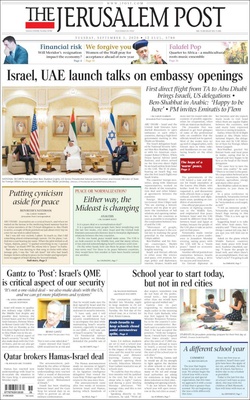
The Jerusalem Post is an English language Israeli broadsheet newspaper based in Jerusalem, founded in 1932 during the British Mandate of Palestine by Gershon Agron as The Palestine Post. In 1950, it changed its name to The Jerusalem Post. In 2004, the paper was bought by Mirkaei Tikshoret, a diversified Israeli media firm controlled by investor Eli Azur. The Jerusalem Post is published in English. Previously, it also had a French edition.

Palestine, officially the State of Palestine, is a country in the southern Levant region of West Asia recognized by 146 out of 193 UN member states. It encompasses the Israeli-occupied West Bank, including East Jerusalem, and the Gaza Strip, collectively known as the occupied Palestinian territories, within the broader geographic and historical Palestine region. Palestine shares most of its borders with Israel, and it borders Jordan to the east and Egypt to the southwest. It has a total land area of 6,020 square kilometres (2,320 sq mi) while its population exceeds five million people. Its proclaimed capital is Jerusalem, while Ramallah serves as its administrative center. Gaza City was its largest city prior to evacuations in 2023.

The Palestine national football team, governed by the Palestinian Football Association, represents Palestine in men's international football. The squad is under the global jurisdiction of FIFA, and is governed continentally by the Asian Football Confederation (AFC).
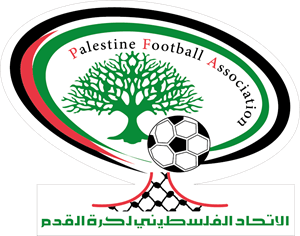
The Palestinian Football Association is the governing body for football in Palestine, and for the men's Palestine national football team and the Palestine women's national football team.

The Arab–Israeli conflict is the phenomenon involving political tension, military conflicts, and other disputes between various Arab countries and Israel, which escalated during the 20th century. The roots of the Arab–Israeli conflict have been attributed to the support by Arab League member countries for the Palestinians, a fellow League member, in the ongoing Israeli–Palestinian conflict; this in turn has been attributed to the simultaneous rise of Zionism and Arab nationalism towards the end of the 19th century, though the two national movements had not clashed until the 1920s.

Situated between three continents, the region of Palestine has a tumultuous history as a crossroads for religion, culture, commerce, and politics. The region was among the earliest to see human habitation, agricultural communities and civilization. In the Bronze Age, the Canaanites established city-states influenced by surrounding civilizations, among them Egypt, which ruled the area in the Late Bronze Age. During the Iron Age, two related Israelite kingdoms, Israel and Judah, controlled much of Palestine, while the Philistines occupied its southern coast. The Assyrians conquered the region in the 8th century BCE, then the Babylonians in c. 601 BCE, followed by the Persians who conquered the Babylonian Empire in 539 BCE. Alexander the Great conquered the Persian Empire in the late 330s BCE, beginning Hellenization.
The foreign relations of the State of Palestine have been conducted since the establishment of the Palestine Liberation Organization (PLO) in 1964. Since the Oslo Accords, it seeks to obtain universal recognition for the State of Palestine on the 1967 borders, with East Jerusalem as its capital. As of 21 June 2024, 146 of the 193 United Nations (UN) member states officially recognize the State of Palestine.

Mandatory Palestine was a geopolitical entity that existed between 1920 and 1948 in the region of Palestine under the terms of the League of Nations Mandate for Palestine.
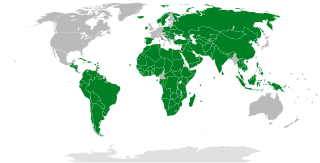
As of June 2024, the State of Palestine is recognized as a sovereign state by 146 of the 193 member states of the United Nations, or just over 75% of all UN members. It has been a non-member observer state of the United Nations General Assembly since November 2012. This limited status is largely due to the fact that the United States, a permanent member of the UN Security Council with veto power, has consistently used its veto or threatened to do so to block Palestine's full UN membership.
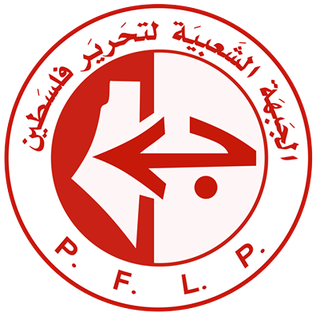
The Popular Front for the Liberation of Palestine is a secular Palestinian Marxist–Leninist and revolutionary socialist organization founded in 1967 by George Habash. It has consistently been the second-largest of the groups forming the Palestine Liberation Organization (PLO), the largest being Fatah.

The Democratic Front for the Liberation of Palestine is a secular Palestinian Marxist–Leninist and Maoist organization. It is also frequently referred to as the Democratic Front, or al-Jabha al-Dīmūqrāṭiyya. It is a member organization of the Palestine Liberation Organization, the Alliance of Palestinian Forces and the Democratic Alliance List.

The two-state solution is a proposed approach to resolving the Israeli–Palestinian conflict, by creating two states on the territory of the former Mandatory Palestine. It is often contrasted with the one-state solution, which is the establishment a single state in former Mandatory Palestine with equal rights for all its inhabitants. The two-state solution is supported by many countries, and the Palestinian Authority. Israel currently does not support the idea, though it has in the past.

Saudi Arabia–Palestine relations refers to the bilateral relationship between the Kingdom of Saudi Arabia and the State of Palestine. Their relationship has many facets, and is at best considered complex. The Saudi government struggles to balance the largely pro-Palestinian sympathies among its populace, with its interest in maintaining positive relations with the US in return for protection against hostile actors. There is also an increasing generational divide on the issue of normalization with Israel, with people under 30 more likely to support normalization and reject pan-Arabism than their elders.
